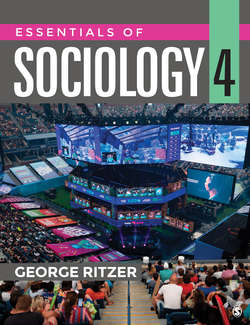Читать книгу Essentials of Sociology - George Ritzer - Страница 23
На сайте Литреса книга снята с продажи.
Digital Living: Blogging and Tweeting about Sociology
ОглавлениеBlogging and tweeting are two popular ways to transmit and acquire information today. Current events are often posted in real time, sometimes by individuals who are witnessing them. The Arab Spring was referred to as the Twitter Revolution because people around the world were able to follow these political uprisings through tweets posted by protestors. Sports fans can follow their favorite teams and on game day receive instantaneous alerts when their team scores a touchdown or scores a run. Individuals who want to find alternative perspectives on social issues from the mainstream press can follow a variety of alternate online sites (e.g., the far-right-wing Breitbart News) and blogs (e.g., the left-leaning Mother Jones). Blogging and tweeting encourage individual agency. They offer the opportunity for all of us to participate in the social construction of reality and can be used as platforms to promote social reforms, such as #BlackLivesMatter. But there are a few structural constraints attached to these methods of communication. Twitter limits tweets to 280 characters. Many popular blogs and Twitter accounts are written and maintained by celebrities, professional experts, and representatives of formal organizations (some of which are highly politicized), who have more power to shape reality than the average person does. Especially notable in this regard is the use of Twitter by Donald Trump, both as presidential candidate and as president, to reach directly his supporters and thereby bypassing the traditional media. Trump’s Twitter account (@RealDonaldTrump) has about 60 million followers.
Sociologists and organizations devoted to sociological theory and research use blogs and tweets to expose others to the sociological imagination, helping individuals at the micro level realize that their private troubles are connected to larger public issues. Popular sociologists who blog include the author of this book, George Ritzer (https://georgeritzer.wordpress.com), who discusses the themes addressed in this book, such as McDonaldization, globalization, and consumption, and Philip Cohen, who writes about family inequality (https://familyinequality.wordpress.com). The Society Pages blog (https://thesocietypages.org) includes a set of sociology blogs such as The Color Line (https://thesocietypages.org/colorline) and Sociology Lens (www.sociologylens.net) that keep readers current on issues pertaining to inequality, race, gender, crime, and health. The American Sociology Association’s blog (speak4sociology.org) offers a forum for its followers to debate sociological issues. A variety of Twitter accounts regularly post comments about and links to relevant sociological topics, including @Soc_Imagination, @SociologyLens, @DiscoverSoc, @SocWomen, and @SocImages. In addition, professional sociologists, such as Michael Burawoy (@burawoy), Matthew Desmond (@just_shelter), Zeynep Tufekci (@zeynep), and Sudhir Venkatesh (@avsudhir), tweet to promote awareness about social problems and publicize their research and social activism.
